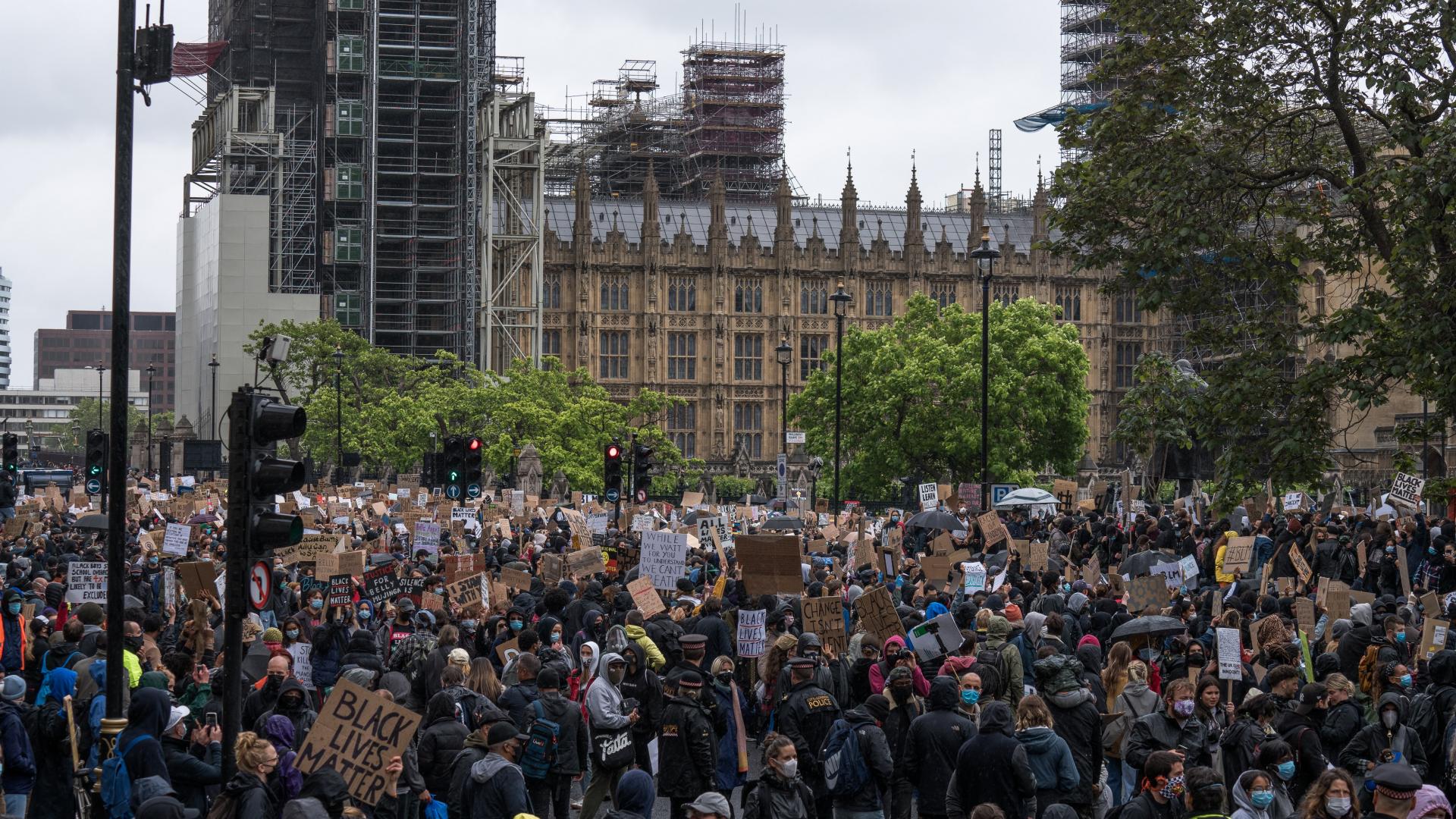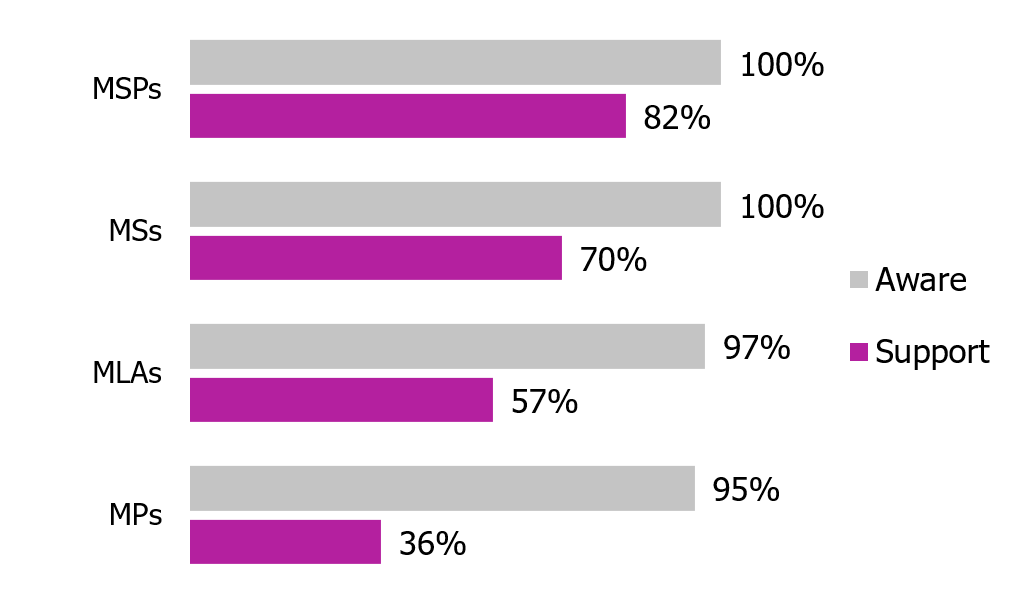The Black Lives Matter (BLM) movement reached a new height in the summer of 2020, following the killing of George Floyd. As the rest of the world looked on, they decided enough was enough, and people took to the streets in world-wide protests. This included prominent displays of action taking place across the UK. With debates ignited in political circles, nfpSynergy wanted to find out what UK politicians thought of BLM.
In our Charity Parliamentary Monitor, we regularly ask MPs about their perceptions towards different campaigns and movements. In 2020, we had the opportunity to ask 100 MPs about Black Lives Matter. We found that whilst almost all MPs in Westminster were aware of BLM, only 36% of MPs supported it (see chart below). Only 6% of Conservative MPs said they supported BLM, compared to 82% of Labour MPs. We typically find higher levels of support among Labour MPs for campaigns. But this is the lowest level of support amongst Conservatives we’ve seen in our research in recent years (along with Extinction Rebellion’s campaigning against climate change, which was also only supported by 6% of Conservative MPs in January 2019).
The comments we received illustrated just how divisive this issue was in Parliament. Labour MPs frequently mentioned systemic racism and discrimination as reasons for supporting BLM.
“Discrimination is still deeply entrenched against Black people in Britain” – Labour MP
“Because we need to right a social wrong and rally against historic and current racism” – Labour MP
“Racial inequalities still rife and systemic racism needs to be rooted out of our institutions urgently”. – Labour MP
On the other hand, common themes in comments from Conservative MPs who didn’t support BLM included it being ‘too political’, ‘Marxist’, ‘anti-police’, ‘extreme’, and ‘divisive’.
“It’s a hard left grouping that are using the sensitive matter of racial equality to drive a Marxist agenda” – Conservative MP
“Totally political and I oppose the political aims of defunding the police, ending nuclear families & rewriting history”. – Conservative MP
“It's not about genuine equality but extreme political activism.” – Conservative MP
We saw a similar division in our research with Members of the Northern Ireland Legislative Assembly (MLAs) – where large BLM protests also took place in Derry/Londonderry and Belfast. Whilst 85% of Nationalist MLAs said they supported BLM, only 17% of Unionists did. Nationalist grouping is made up of ‘left-leaning’ parties, with the Unionist group consisting of more ‘right-leaning’ parties. Comments from Nationalist MLAs included mentions of being ‘opposed to institutionalised racism’ and the importance of raising awareness of ‘endemic racism in society’. Meanwhile, comments of BLM being ‘too political’ were echoed by several Unionist MLAs’ as reasons why they didn’t support BLM.
Our research in Wales and Scotland paints quite a different picture…
Despite thousands protesting through Edinburgh’s Holyrood Park and sparking debate within political circles in Holyrood – BLM managed to maintain high levels of support. In response to BLM demonstrations, the Welsh Government announced its audit into statues, street names and buildings. However, there’s still a lack of support amongst Conservative Members of the Scottish Parliament (MSPs) and Members of the Senedd in Wales (MSs) in comparison to other parties.
As shown in the chart below, awareness of BLM is almost universal across MSPs and MSs and a whopping 82% of MSPs and 70% of MSs support BLM (compared to just 36% of MPs)1. For the Scottish parliament, the rates of support by party equate to: 100% of SNP MSPs, 91% of Labour MSPs, and 42% of Conservative MPs.
“I want a society of tolerance and understanding and for Scotland, addressing our colonial past can help make progress in this regard. It will, I believe, also educate more people to the appalling activities committed by our ancestors.” – SNP MSP
“I very much sympathise with those who are subjected to racism of any kind.” – Conservative MS
Awareness and Support for BLM
“Listed below are a number of campaigns, initiatives or programmes run by various charities, pressure groups, regulators or voluntary organisations. Please indicate your level of awareness of each one.” Definitely + probably aware combined and “For each campaign, initiative or programme listed below, please indicate whether or not you support it and why.” Ranked by Support
Source: Celtic Charity Parliamentary Monitor, Sept 2020-Jan 2021, nfpSynergy | Base: 37 MSPs, 24 MSs, 34 MLAs
Source: Charity Parliamentary Monitor, Nov 2020 - Jan 2021, nfpSynergy| Base:100 MPs
Labour, SNP, and Nationalist comments focus on the issues represented by BLM as ‘societal’ and Conservative and Unionist comments as ‘political’. Is it that Conservative opinions are affected by pressures put on government (being the leading party in Westminster)? Or would we have seen a difference in overall support for BLM if Westminster held a Labour majority, as we see higher level of support in Scotland and Wales, possibly down to their ‘left-leaning’ majorities? Does this data suggest variation in support might be down to other, perhaps underlying, differences in demographic makeup, values, opinions, and the ‘echo chambers’ members of different political parties operate within?
Perhaps devolved governments are more receptive to change. They have historically looked to deviate from Westminster, emphasising their independence, and taking action towards structural and institutional racism may provide another opportunity to do this. Take the National Trust in England’s report addressing links between slavery and its historical sites as an example. This proved to be highly divisive in Westminster. However, levels of support for BLM within Holyrood and the Senedd suggests similar efforts by charities to address structural racism would be met with support from MSPs and MSs. This difference between Westminster and some of the devolved nations is something for all campaigning organisations in the UK to bear in mind. If you are a charity working and campaigning in devolved regions, especially campaigning to influence policy change or election commitments, you may want to consider finding out how support and awareness differs between Westminster and other political regions. Regardless, with BLM finding strong political support in the Scottish and Welsh Parliaments, there is scope for significant change. For example, we are seeing policy changes in some areas, with Black history lessons to become mandatory in Welsh schools. Meanwhile Westminster claimed the English school curriculum is sufficient enough and recently even suggested ‘institutional racism doesn’t exist’!
Ultimately, in the issue of tackling institutional racism in the UK, it seems there’s a long road ahead. Especially when faced with evidence of Conservatives not being supportive of BLM, paired with the government’s failure to acknowledge the existence of institutional racism. Whilst there is support and progression in devolved institutions, protests have recently revived in Wales, where there have already been two incidents of deaths linked to individuals being under police custody this year. I hope we will see support for BLM translate into significant action, progression, and change in Scotland and Wales. But for me, the jury is still out on whether there will be any significant commitments to tackling institutional racism in England under the current Conservative led government.
To find out more about research with MPs please contact: CPM@nfpsynergy.net
To find out more about our research with MLAs, MSPs or MSs please contact: CCPM@nfpsynergy.net.
1 We would like to note the base sizes for MLAs, MSPs, and MSs research are lower – 34 MLAs, 37 MSPs and 24 MSs were surveyed. However, all samples are representative.


